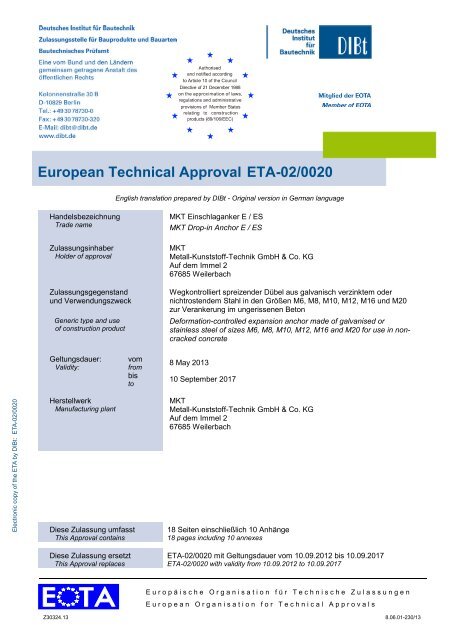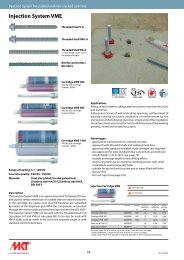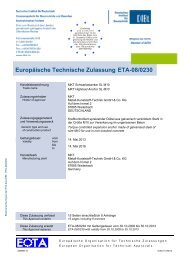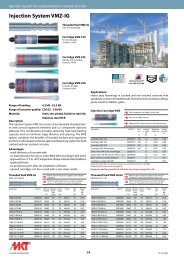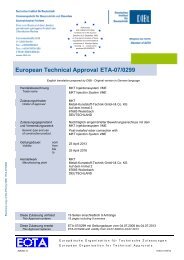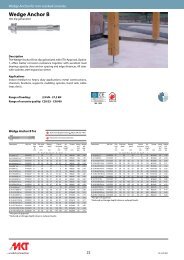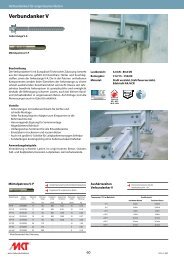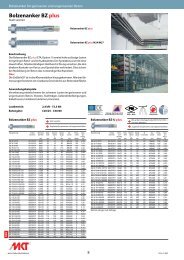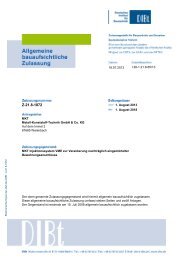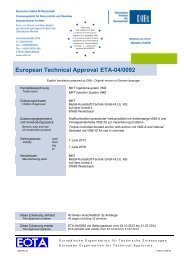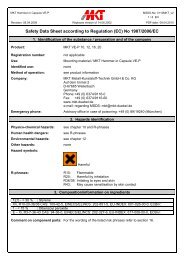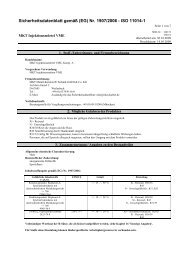ETA-02/0020 - MKT Metall-Kunststoff-Technik GmbH & Co. KG
ETA-02/0020 - MKT Metall-Kunststoff-Technik GmbH & Co. KG
ETA-02/0020 - MKT Metall-Kunststoff-Technik GmbH & Co. KG
Create successful ePaper yourself
Turn your PDF publications into a flip-book with our unique Google optimized e-Paper software.
European Technical Approval <strong>ETA</strong>-<strong>02</strong>/0<strong>02</strong>0<br />
English translation prepared by DIBt - Original version in German language<br />
Handelsbezeichnung<br />
Trade name<br />
Zulassungsinhaber<br />
Holder of approval<br />
Zulassungsgegenstand<br />
und Verwendungszweck<br />
Generic type and use<br />
of construction product<br />
<strong>MKT</strong> Einschlaganker E / ES<br />
<strong>MKT</strong> Drop-in Anchor E / ES<br />
<strong>MKT</strong><br />
<strong>Metall</strong>-<strong>Kunststoff</strong>-<strong>Technik</strong> <strong>GmbH</strong> & <strong>Co</strong>. <strong>KG</strong><br />
Auf dem Immel 2<br />
67685 Weilerbach<br />
Wegkontrolliert spreizender Dübel aus galvanisch verzinktem oder<br />
nichtrostendem Stahl in den Größen M6, M8, M10, M12, M16 und M20<br />
zur Verankerung im ungerissenen Beton<br />
Deformation-controlled expansion anchor made of galvanised or<br />
stainless steel of sizes M6, M8, M10, M12, M16 and M20 for use in noncracked<br />
concrete<br />
Geltungsdauer:<br />
Validity:<br />
vom<br />
from<br />
bis<br />
to<br />
8 May 2013<br />
10 September 2017<br />
Electronic copy of the <strong>ETA</strong> by DIBt: <strong>ETA</strong>-<strong>02</strong>/0<strong>02</strong>0<br />
Herstellwerk<br />
Manufacturing plant<br />
Diese Zulassung umfasst<br />
This Approval contains<br />
Diese Zulassung ersetzt<br />
This Approval replaces<br />
<strong>MKT</strong><br />
<strong>Metall</strong>-<strong>Kunststoff</strong>-<strong>Technik</strong> <strong>GmbH</strong> & <strong>Co</strong>. <strong>KG</strong><br />
Auf dem Immel 2<br />
67685 Weilerbach<br />
18 Seiten einschließlich 10 Anhänge<br />
18 pages including 10 annexes<br />
<strong>ETA</strong>-<strong>02</strong>/0<strong>02</strong>0 mit Geltungsdauer vom 10.09.2012 bis 10.09.2017<br />
<strong>ETA</strong>-<strong>02</strong>/0<strong>02</strong>0 with validity from 10.09.2012 to 10.09.2017<br />
Europäische Organisation für Technische Zulassungen<br />
European Organisation for Technical Approvals<br />
Z30324.13 8.06.01-230/13
European technical approval<br />
<strong>ETA</strong>-<strong>02</strong>/0<strong>02</strong>0<br />
English translation prepared by DIBt<br />
Page 2 of 18 | 8 May 2013<br />
I<br />
LEGAL BASES AND GENERAL CONDITIONS<br />
1 This European technical approval is issued by Deutsches Institut für Bautechnik in accordance<br />
with:<br />
−<br />
−<br />
<strong>Co</strong>uncil Directive 89/106/EEC of 21 December 1988 on the approximation of laws,<br />
regulations and administrative provisions of Member States relating to construction<br />
products 1 , modified by <strong>Co</strong>uncil Directive 93/68/EEC 2 and Regulation (EC) N° 1882/2003 of<br />
the European Parliament and of the <strong>Co</strong>uncil 3 ;<br />
Gesetz über das In-Verkehr-Bringen von und den freien Warenverkehr mit Bauprodukten zur<br />
Umsetzung der Richtlinie 89/106/EWG des Rates vom 21. Dezember 1988 zur Angleichung<br />
der Rechts- und Verwaltungsvorschriften der Mitgliedstaaten über Bauprodukte und anderer<br />
Rechtsakte der Europäischen Gemeinschaften (Bauproduktengesetz - BauPG) vom<br />
28. April 1998 4 , as amended by Article 2 of the law of 8 November 2011 5 ;<br />
− <strong>Co</strong>mmon Procedural Rules for Requesting, Preparing and the Granting of European<br />
technical approvals set out in the Annex to <strong>Co</strong>mmission Decision 94/23/EC 6 ;<br />
− Guideline for European technical approval of "Metal anchors for use in concrete - Part 4:<br />
Deformation controlled expansion anchors", <strong>ETA</strong>G 001-04.<br />
2 Deutsches Institut für Bautechnik is authorized to check whether the provisions of this European<br />
technical approval are met. Checking may take place in the manufacturing plant. Nevertheless,<br />
the responsibility for the conformity of the products to the European technical approval and for<br />
their fitness for the intended use remains with the holder of the European technical approval.<br />
3 This European technical approval is not to be transferred to manufacturers or agents of<br />
manufacturers other than those indicated on page 1, or manufacturing plants other than those<br />
indicated on page 1 of this European technical approval.<br />
4 This European technical approval may be withdrawn by Deutsches Institut für Bautechnik, in<br />
particular pursuant to information by the <strong>Co</strong>mmission according to Article 5(1) of <strong>Co</strong>uncil<br />
Directive 89/106/EEC.<br />
Electronic copy of the <strong>ETA</strong> by DIBt: <strong>ETA</strong>-<strong>02</strong>/0<strong>02</strong>0<br />
5 Reproduction of this European technical approval including transmission by electronic means<br />
shall be in full. However, partial reproduction can be made with the written consent of Deutsches<br />
Institut für Bautechnik. In this case partial reproduction has to be designated as such. Texts and<br />
drawings of advertising brochures shall not contradict or misuse the European technical<br />
approval.<br />
6 The European technical approval is issued by the approval body in its official language. This<br />
version corresponds fully to the version circulated within EOTA. Translations into other<br />
languages have to be designated as such.<br />
1<br />
2<br />
3<br />
4<br />
5<br />
6<br />
Official Journal of the European <strong>Co</strong>mmunities L 40, 11 February 1989, p. 12<br />
Official Journal of the European <strong>Co</strong>mmunities L 220, 30 August 1993, p. 1<br />
Official Journal of the European Union L 284, 31 October 2003, p. 25<br />
Bundesgesetzblatt Teil I 1998, p. 812<br />
Bundesgesetzblatt Teil I 2011, p. 2178<br />
Official Journal of the European <strong>Co</strong>mmunities L 17, 20 January 1994, p. 34<br />
Z30324.13 8.06.01-230/13
European technical approval<br />
<strong>ETA</strong>-<strong>02</strong>/0<strong>02</strong>0<br />
English translation prepared by DIBt<br />
Page 3 of 18 | 8 May 2013<br />
II<br />
SPECIFIC CONDITIONS OF THE EUROPEAN TECHNICAL APPROVAL<br />
1 Definition of product and intended use<br />
1.1 Definition of the construction product<br />
The <strong>MKT</strong> Drop-in Anchor E / ES is an anchor made of galvanised steel, stainless steel or high<br />
corrosion resistant steel in sizes M6×30, M8×30, M8×40, M10×30, M10×40, M12×50, M12×80,<br />
M16×65, M16×80 and M20×20. The anchor is placed into a drilled hole and anchored by<br />
deformation-controlled expansion.<br />
The product (types, sizes) and an illustration of the installed anchor are given in Annex 1.<br />
The fixture shall be anchored with a fastening screw or threaded rod according to Annex 4.<br />
Electronic copy of the <strong>ETA</strong> by DIBt: <strong>ETA</strong>-<strong>02</strong>/0<strong>02</strong>0<br />
1.2 Intended use<br />
The anchor is intended to be used for anchorages for which requirements for mechanical<br />
resistance and stability and safety in use in the sense of the Essential Requirements 1 and 4 of<br />
<strong>Co</strong>uncil Directive 89/106 EEC shall be fulfilled and failure of anchorages made with these<br />
products would cause risk to human life and/or lead to considerable economic consequences.<br />
The anchor is to be used only for anchorages subject to static or quasi-static loading in<br />
reinforced or unreinforced normal weight concrete of strength classes C20/25 at minimum and<br />
C50/60 at most according to EN 206-1:2000-12.<br />
The anchor may be anchored in non-cracked concrete only.<br />
<strong>MKT</strong> Drop-in Anchor made of galvanised steel:<br />
The anchor made of galvanised steel may only be used in structures subject to dry internal<br />
conditions.<br />
<strong>MKT</strong> Drop-in Anchor made of stainless steel:<br />
The anchor made of stainless steel may be used in structures subject to dry internal<br />
conditions and also in structures subject to external atmospheric exposure (including<br />
industrial and marine environment), or exposure in permanently damp internal conditions, if<br />
no particular aggressive conditions exist. Such particular aggressive conditions are e.g.<br />
permanent, alternating immersion in seawater or the splash zone of seawater, chloride<br />
atmosphere of indoor swimming pools or atmosphere with extreme chemical pollution (e.g. in<br />
desulphurization plants or road tunnels where de-icing materials are used).<br />
<strong>MKT</strong> Drop-in anchor made of high corrosion resistant steel:<br />
The anchor made of high corrosion resistant steel may be used in structures subject to dry<br />
internal conditions and also in structures subject to external atmospheric exposure, in<br />
permanently damp internal conditions or in other particular aggressive conditions. Such<br />
particular aggressive conditions are e.g. permanent, alternating immersion in seawater or the<br />
splash zone of seawater, chloride atmosphere of indoor swimming pools or atmosphere with<br />
chemical pollution (e.g. in desulphurization plants or road tunnels where de-icing materials<br />
are used).<br />
Z30324.13 8.06.01-230/13
European technical approval<br />
<strong>ETA</strong>-<strong>02</strong>/0<strong>02</strong>0<br />
English translation prepared by DIBt<br />
Page 4 of 18 | 8 May 2013<br />
The provisions made in this European technical Approval are based on an assumed intended<br />
working life of the anchor of 50 years. The indications given on the working life cannot be<br />
interpreted as a guarantee given by the producer, but are to be regarded only as a means for<br />
choosing the right products in relation to the expected economically reasonable working life of<br />
the works.<br />
2 Characteristics of product and methods of verification<br />
2.1 Characteristics of product<br />
The anchor corresponds to the drawings and provisions given in Annex 2. The characteristic<br />
material values, dimensions and tolerances of the anchor not indicated in Annex 2 shall<br />
correspond to the respective values laid down in the technical documentation 7 of this European<br />
technical approval.<br />
The characteristic values for the design of the anchorages in accordance with the "Guideline for<br />
European technical approval of Metal Anchors for use in concrete", Annex C, Method A are<br />
given in Annex 5 and 6.<br />
The characteristic values for the design of the anchorages in accordance with the design<br />
method A of CEN/TS 1992-4-4 are given in Annex 7 and 8.<br />
Each anchor is marked according to Annex 2 with the identifying mark of the producer, the<br />
anchor identity and the thread size. Each anchor made of stainless steel is marked with the<br />
additional letters "A4" and each anchor made of high corrosion resistant steel is marked with the<br />
additional letters "HCR".<br />
The anchor shall only be packaged and supplied as a complete unit.<br />
Electronic copy of the <strong>ETA</strong> by DIBt: <strong>ETA</strong>-<strong>02</strong>/0<strong>02</strong>0<br />
2.2 Methods of verification<br />
The assessment of fitness of the anchor for the intended use in relation to the requirements for<br />
mechanical resistance and stability and safety in use in the sense of the Essential<br />
Requirements 1 and 4 has been made in accordance with the "Guideline for European technical<br />
approval of Metal Anchors for Use in <strong>Co</strong>ncrete", Part 1 "Anchors in general" and Part 4<br />
"Deformation-controlled expansion anchors" on the basis of Option 7.<br />
In addition to the specific clauses relating to dangerous substances contained in this European<br />
technical approval, there may be other requirements applicable to the products falling within its<br />
scope (e.g. transposed European legislation and national laws, regulations and administrative<br />
provisions). In order to meet the provisions of the <strong>Co</strong>nstruction Products Directive, these<br />
requirements need also to be complied with, when and where they apply.<br />
7<br />
The technical documentation of this European technical approval is deposited at the Deutsches Institut für Bautechnik<br />
and, as far as relevant for the tasks of the approved bodies involved in the attestation of conformity procedure, is<br />
handed over to the approved bodies.<br />
Z30324.13 8.06.01-230/13
European technical approval<br />
<strong>ETA</strong>-<strong>02</strong>/0<strong>02</strong>0<br />
English translation prepared by DIBt<br />
Page 5 of 18 | 8 May 2013<br />
3 Evaluation and attestation of conformity and CE marking<br />
3.1 System of attestation of conformity<br />
According to the decision 96/582/EG of the European <strong>Co</strong>mmission 8 the system 2(i) (referred to<br />
as System 1) of attestation of conformity applies.<br />
This system of attestation of conformity is defined as follows:<br />
System 1: Certification of the conformity of the product by an approved certification body on<br />
the basis of:<br />
(a) Tasks for the manufacturer:<br />
(1) factory production control;<br />
(2) further testing of samples taken at the factory by the manufacturer in accordance<br />
with a prescribed control plan;<br />
(b) Tasks for the approved body:<br />
(3) initial type-testing of the product;<br />
(4) initial inspection of factory and of factory production control;<br />
(5) continuous surveillance, assessment and approval of factory production control.<br />
Note: Approved bodies are also referred to as "notified bodies".<br />
Electronic copy of the <strong>ETA</strong> by DIBt: <strong>ETA</strong>-<strong>02</strong>/0<strong>02</strong>0<br />
3.2 Responsibilities<br />
3.2.1 Tasks of the manufacturer<br />
3.2.1.1 Factory production control<br />
The manufacturer shall exercise permanent internal control of production. All the elements,<br />
requirements and provisions adopted by the manufacturer shall be documented in a systematic<br />
manner in the form of written policies and procedures, including records of results performed.<br />
This production control system shall insure that the product is in conformity with this European<br />
technical approval.<br />
The manufacturer may only use initial / raw / constituent materials stated in the technical<br />
documentation of this European technical approval.<br />
The factory production control shall be in accordance with the control plan which is part of the<br />
technical documentation of this European technical approval. The control plan is laid down in the<br />
context of the factory production control system operated by the manufacturer and deposited at<br />
Deutsches Institut für Bautechnik. 9<br />
The results of factory production control shall be recorded and evaluated in accordance with the<br />
provisions of the control plan.<br />
3.2.1.2 Other tasks of manufacturer<br />
The manufacturer shall, on the basis of a contract, involve a body which is approved for the<br />
tasks referred to in section 3.1 in the field of anchors in order to undertake the actions laid down<br />
in section 3.2.2. For this purpose, the control plan referred to in sections 3.2.1.1 and 3.2.2 shall<br />
be handed over by the manufacturer to the approved body involved.<br />
The manufacturer shall make a declaration of conformity, stating that the construction product is<br />
in conformity with the provisions of this European technical approval.<br />
8<br />
9<br />
Official Journal of the European <strong>Co</strong>mmunities L 254 of 08.10.1996<br />
The control plan is a confidential part of the documentation of the European technical approval, but not published<br />
together with the European technical approval and only handed over to the approved body involved in the procedure of<br />
attestation of conformity.<br />
See section 3.2.2.<br />
Z30324.13 8.06.01-230/13
European technical approval<br />
<strong>ETA</strong>-<strong>02</strong>/0<strong>02</strong>0<br />
English translation prepared by DIBt<br />
Page 6 of 18 | 8 May 2013<br />
3.2.2 Tasks of approved bodies<br />
The approved body shall perform the following tasks in accordance with the provisions laid down<br />
in the control plan:<br />
−<br />
−<br />
initial type-testing of the product,<br />
initial inspection of factory and of factory production control,<br />
− continuous surveillance, assessment and approval of factory production control.<br />
The approved body shall retain the essential points of its actions referred to above and state the<br />
results obtained and conclusions drawn in a written report.<br />
The approved certification body involved by the manufacturer shall issue an EC certificate of<br />
conformity of the product stating the conformity with the provisions of this European technical<br />
approval.<br />
In cases where the provisions of the European technical approval and its control plan are no<br />
longer fulfilled the certification body shall withdraw the certificate of conformity and inform<br />
Deutsches Institut für Bautechnik without delay.<br />
3.3 CE marking<br />
The CE marking shall be affixed on each packaging of anchors. The letters "CE" shall be<br />
followed by the identification number of the approved certification body, where relevant, and be<br />
accompanied by the following additional information:<br />
−<br />
−<br />
−<br />
−<br />
−<br />
the name and address of the producer (legal entity responsible for the manufacturer),<br />
the last two digits of the year in which the CE marking was affixed,<br />
the number of the EC certificate of conformity for the product,<br />
the number of the European technical approval,<br />
the number of the guideline for European technical approval,<br />
− use category (<strong>ETA</strong>G 001-1, Option 7),<br />
−<br />
size.<br />
Electronic copy of the <strong>ETA</strong> by DIBt: <strong>ETA</strong>-<strong>02</strong>/0<strong>02</strong>0<br />
4 Assumptions under which the fitness of the product for the intended use was favourably<br />
assessed<br />
4.1 Manufacturing<br />
The European technical approval is issued for the product on the basis of agreed<br />
data/information, deposited with Deutsches Institut für Bautechnik, which identifies the product<br />
that has been assessed and judged. Changes to the product or production process, which could<br />
result in this deposited data/information being incorrect, should be notified to Deutsches Institut<br />
für Bautechnik before the changes are introduced. Deutsches Institut für Bautechnik will decide<br />
whether or not such changes affect the European technical approval and consequently the<br />
validity of the CE marking on the basis of the European technical approval and if so whether<br />
further assessment or alterations to the European technical approval shall be necessary.<br />
Z30324.13 8.06.01-230/13
European technical approval<br />
<strong>ETA</strong>-<strong>02</strong>/0<strong>02</strong>0<br />
English translation prepared by DIBt<br />
Page 7 of 18 | 8 May 2013<br />
4.2 Design of anchorages<br />
The fitness of the anchor for the intended use is given under the following conditions:<br />
The anchorages are designed either in accordance with the<br />
− "Guideline for European technical approval of Metal Anchors for use in concrete", Annex C,<br />
method A<br />
or in accordance with the<br />
− CEN/TS 1992-4-4 "Design of fastenings for use in concrete", Part 4-4: "Post-installed<br />
fasteners - Mechanical systems", design method A,<br />
under the responsibility of an engineer experienced in anchorages and concrete work. A mixture<br />
of the design methods is not allowed.<br />
Verifiable calculation notes and drawings are prepared taking account of the loads to be<br />
anchored.<br />
The position of the anchor is indicated on the design drawings (e.g. position of the anchor<br />
relative to reinforcement or to supports).<br />
The strength class and the length of the fastening screw or threaded rod shall be defined by the<br />
designing engineer. The choice of the length shall account for the available thread length, the<br />
minimum screwing depth, the thickness of fixture and tolerances of member and fixture. The<br />
strength class and the minimum screwing depth of the fastening screw or threaded rod shall be<br />
met the requirements according to Annex 4.<br />
Electronic copy of the <strong>ETA</strong> by DIBt: <strong>ETA</strong>-<strong>02</strong>/0<strong>02</strong>0<br />
4.3 Installation of anchors<br />
The fitness for use of the anchor can only be assumed if the anchor is installed as follows:<br />
− Anchor installation carried out by appropriately qualified personnel and under the supervision<br />
of the person responsible for technical matters of the site.<br />
− Use of the anchor only as supplied by the manufacturer without exchanging the components<br />
of an anchor.<br />
− Anchor installation in accordance with the manufacturer’s specifications and drawings and<br />
using the appropriate tools;<br />
− Checks before placing the anchor to ensure that the strength class of the concrete in which<br />
the anchor is to be placed is in the range given and is not lower than that of the concrete to<br />
which the characteristic loads apply.<br />
− Check of concrete being well compacted, e.g. without significant voids.<br />
− Edge distance and spacing not less than the specified values without minus tolerances.<br />
− Positioning of the drill holes without damaging the reinforcement.<br />
− Drill hole by hammer drilling only.<br />
− In case of aborted hole: new drilling at a minimum distance away of twice the depth of the<br />
aborted hole or smaller distance if the aborted drill hole is filled with high strength mortar and<br />
if under shear or oblique tension load it is not in the direction of load application.<br />
− Cleaning of the hole of drilling dust.<br />
− Anchor installation according to manufacturer's instructions given in Annex 10.<br />
− Anchor expansion by impact on the cone using the manual setting tools given in Annex 3.<br />
The anchor is properly set if the stop of the setting tool reaches the expansion sleeve. The<br />
setting tool for marking leaves a visible mark on the sleeve as illustrated in Annex 3.<br />
Z30324.13 8.06.01-230/13
European technical approval<br />
<strong>ETA</strong>-<strong>02</strong>/0<strong>02</strong>0<br />
English translation prepared by DIBt<br />
Page 8 of 18 | 8 May 2013<br />
− The fastening screw or threaded rod shall correspond to the requirements given in Annex 4.<br />
− Installation torque moments are not required for functioning of the anchor. However, the<br />
torque moments given in Annex 4 must not be exceeded.<br />
5 Responsibility of the manufacturer<br />
It is in the responsibility of the manufacturer to ensure that the information on the specific<br />
conditions according to 1 and 2 including Annexes referred to as well as sections 4.2 and 4.3 is<br />
given to those who are concerned. This information may be made by reproduction of the<br />
respective parts of the European technical approval. In addition all installation data shall be<br />
shown clearly on the package and/or on an enclosed instruction sheet, preferably using<br />
illustration(s).<br />
The minimum data required are:<br />
− drill bit diameter,<br />
− thread diameter,<br />
− minimum effective anchorage depth,<br />
− available thread length and minimum screwing depth of the fastening screw,<br />
− minimum hole depth,<br />
− torque moment,<br />
− information on the installation procedure, including cleaning of the hole, preferably by means<br />
of an illustration,<br />
− reference to any special installation equipment needed,<br />
− identification of the manufacturing batch.<br />
All data shall be presented in a clear and explicit form.<br />
Uwe Bender<br />
Head of Department<br />
beglaubigt:<br />
Tempel<br />
Electronic copy of the <strong>ETA</strong> by DIBt: <strong>ETA</strong>-<strong>02</strong>/0<strong>02</strong>0<br />
Z30324.13 8.06.01-230/13
Page 9 of European technical approval<br />
<strong>ETA</strong>-<strong>02</strong>/0<strong>02</strong>0 of 8 May 2013<br />
English translation prepared by DIBt<br />
Electronic copy of the <strong>ETA</strong> by DIBt: <strong>ETA</strong>-<strong>02</strong>/0<strong>02</strong>0<br />
Z41648.13 8.06.01-230/13
Page 10 of European technical approval<br />
<strong>ETA</strong>-<strong>02</strong>/0<strong>02</strong>0 of 8 May 2013<br />
English translation prepared by DIBt<br />
Electronic copy of the <strong>ETA</strong> by DIBt: <strong>ETA</strong>-<strong>02</strong>/0<strong>02</strong>0<br />
Z41648.13 8.06.01-230/13
Page 11 of European technical approval<br />
<strong>ETA</strong>-<strong>02</strong>/0<strong>02</strong>0 of 8 May 2013<br />
English translation prepared by DIBt<br />
Electronic copy of the <strong>ETA</strong> by DIBt: <strong>ETA</strong>-<strong>02</strong>/0<strong>02</strong>0<br />
Z41648.13 8.06.01-230/13
Page 12 of European technical approval<br />
<strong>ETA</strong>-<strong>02</strong>/0<strong>02</strong>0 of 8 May 2013<br />
English translation prepared by DIBt<br />
Electronic copy of the <strong>ETA</strong> by DIBt: <strong>ETA</strong>-<strong>02</strong>/0<strong>02</strong>0<br />
Z41648.13 8.06.01-230/13
Page 13 of European technical approval<br />
<strong>ETA</strong>-<strong>02</strong>/0<strong>02</strong>0 of 8 May 2013<br />
English translation prepared by DIBt<br />
Electronic copy of the <strong>ETA</strong> by DIBt: <strong>ETA</strong>-<strong>02</strong>/0<strong>02</strong>0<br />
Z41648.13 8.06.01-230/13
Page 14 of European technical approval<br />
<strong>ETA</strong>-<strong>02</strong>/0<strong>02</strong>0 of 8 May 2013<br />
English translation prepared by DIBt<br />
Electronic copy of the <strong>ETA</strong> by DIBt: <strong>ETA</strong>-<strong>02</strong>/0<strong>02</strong>0<br />
Z41648.13 8.06.01-230/13
Page 15 of European technical approval<br />
<strong>ETA</strong>-<strong>02</strong>/0<strong>02</strong>0 of 8 May 2013<br />
English translation prepared by DIBt<br />
Electronic copy of the <strong>ETA</strong> by DIBt: <strong>ETA</strong>-<strong>02</strong>/0<strong>02</strong>0<br />
Z41648.13 8.06.01-230/13
Page 16 of European technical approval<br />
<strong>ETA</strong>-<strong>02</strong>/0<strong>02</strong>0 of 8 May 2013<br />
English translation prepared by DIBt<br />
Electronic copy of the <strong>ETA</strong> by DIBt: <strong>ETA</strong>-<strong>02</strong>/0<strong>02</strong>0<br />
Z41648.13 8.06.01-230/13
Page 17 of European technical approval<br />
<strong>ETA</strong>-<strong>02</strong>/0<strong>02</strong>0 of 8 May 2013<br />
English translation prepared by DIBt<br />
Electronic copy of the <strong>ETA</strong> by DIBt: <strong>ETA</strong>-<strong>02</strong>/0<strong>02</strong>0<br />
Z41648.13 8.06.01-230/13
Page 18 of European technical approval<br />
<strong>ETA</strong>-<strong>02</strong>/0<strong>02</strong>0 of 8 May 2013<br />
English translation prepared by DIBt<br />
Electronic copy of the <strong>ETA</strong> by DIBt: <strong>ETA</strong>-<strong>02</strong>/0<strong>02</strong>0<br />
Z41648.13 8.06.01-230/13


